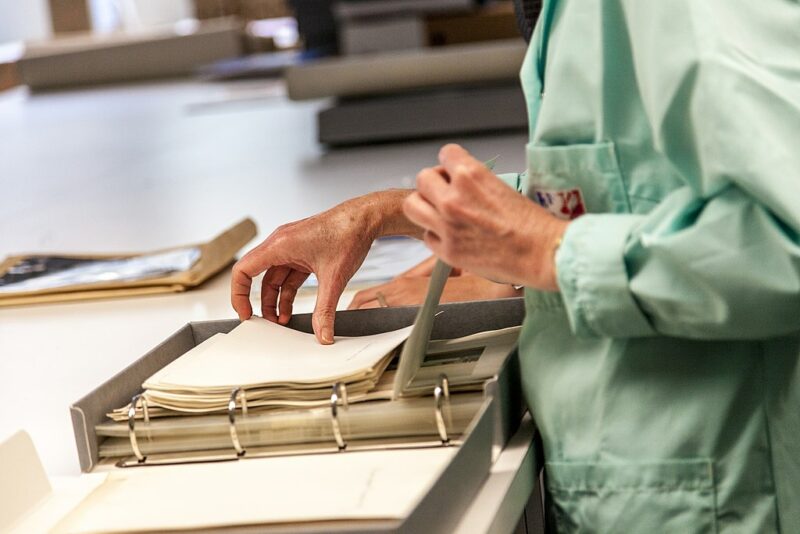Long Range Plan: Practice
17 April 2024 – Julius L. Jones
“Practice,” is one of the five pillars of the NCPH’s Long Range Plan. This pillar consists of creating tangible resources and new programming that will better equip the organization to support the needs of the public history practitioners who are putting history to work in the world. By renewing our commitment to the practice of public history, NCPH will become the destination that professionals turn to for the support, encouragement, and resources that will empower them to excel throughout their entire careers.

Lyon Municipal Archives. Image credit: Laurent Vella, Wikimedia Commons, CC0
The vibrancy of the public history field is due to the tireless efforts of those who work diligently in museums, historical societies, libraries, archival societies, and government repositories, as well as training the next generation of scholar-practitioners in colleges and universities worldwide. To that end, the Long Range Plan commits NCPH to maintain constant engagement with public historians from the moment they enter their respective academic programs through all the stages of their careers in the field.
Public history, like society as a whole, continues to evolve at a rapid speed and it is vital that NCPH support practitioners as they attempt to navigate those changes. The “Practice” pillar of the Long Range Plan (LRP) aims to increase NCPH’s skills-based workshop offerings to better serve its members as they attempt to remain abreast of emergent trends and technologies. The NCPH will develop and offer these programs with direct input from our members. Due to the lingering effects of the COVID-19 pandemic, Public history professionals need support navigating a field that has become less secure with more contingent positions. Now more than ever, the field must commit itself to supporting practitioners and institutions in cultivating equitable, diverse, and fair workplaces. Additionally, we must help employers foster a thriving quality of life for their employees through unbiased and transparent compensation policies.
Moreover, practitioners are increasingly expected to have a strong business acumen that will equip them with the skills necessary to ensure the economic health and longevity of public history institutions. NCPH will convene a working group to develop resources aimed at equipping public history professionals on the business of the field, allowing them to navigate an ever-changing marketplace with skillful confidence. This working group will, among other activities, develop pricing recommendations for consulting work, generate guidance on how to best support job seekers, create salary negotiation resources, and implement new annual meeting programs that ensure support for different career stages, from academic training through retirement.
The work of the NCPH cannot get done without the support of countless volunteers who give generously of their time and talent in service to the organization. Yet, at the same time, we understand the difficulty of asking our members to take on additional work without compensation when far too many of us are un- or underemployed. Making the practice of public history more accessible is essential to the success of the LRP and the field as a whole, and NCPH is determined to identify financial resources that will better support our event organizers, presenters, and publication contributors. Through this effort, we hope that more emerging professionals, non-traditional scholars, and those in public history-adjacent fields will be able to engage in our community.
Finally, through the LRP the NCPH is working to expand the scope of both The Public Historian and History@Work, so that the opportunities to contribute to these publications are accessible to a broader range of scholars and practitioners. The organization hopes to make the process and criteria for contributors more open, accessible, and transparent. Our goal is to create greater opportunities for graduate students and emerging professionals to establish themselves in the field by publishing scholarship that critically reflects on the practice of public history. New voices will allow the NCPH to fulfill its mission of being the go-to destination to engage with the best practices in public history projects and scholarship.
Importantly, each member, professional, and practitioner has a role to play in shaping the practice of public history for future generations. Please continue to support the NCPH and engage with the work of implementing our Long Range Plan. The Long Range Planning Committee is eager to hear from you and work with you to ensure the success and vitality of the NCPH for years to come.
~Julius L. Jones, Ph.D., is a member of the National Council on Public History’s Long Range Planning committee. A former curator at the DuSable Museum of African American History and the Chicago History Museum, he is currently an assistant professor of history at the University of North Carolina Wilmington.



